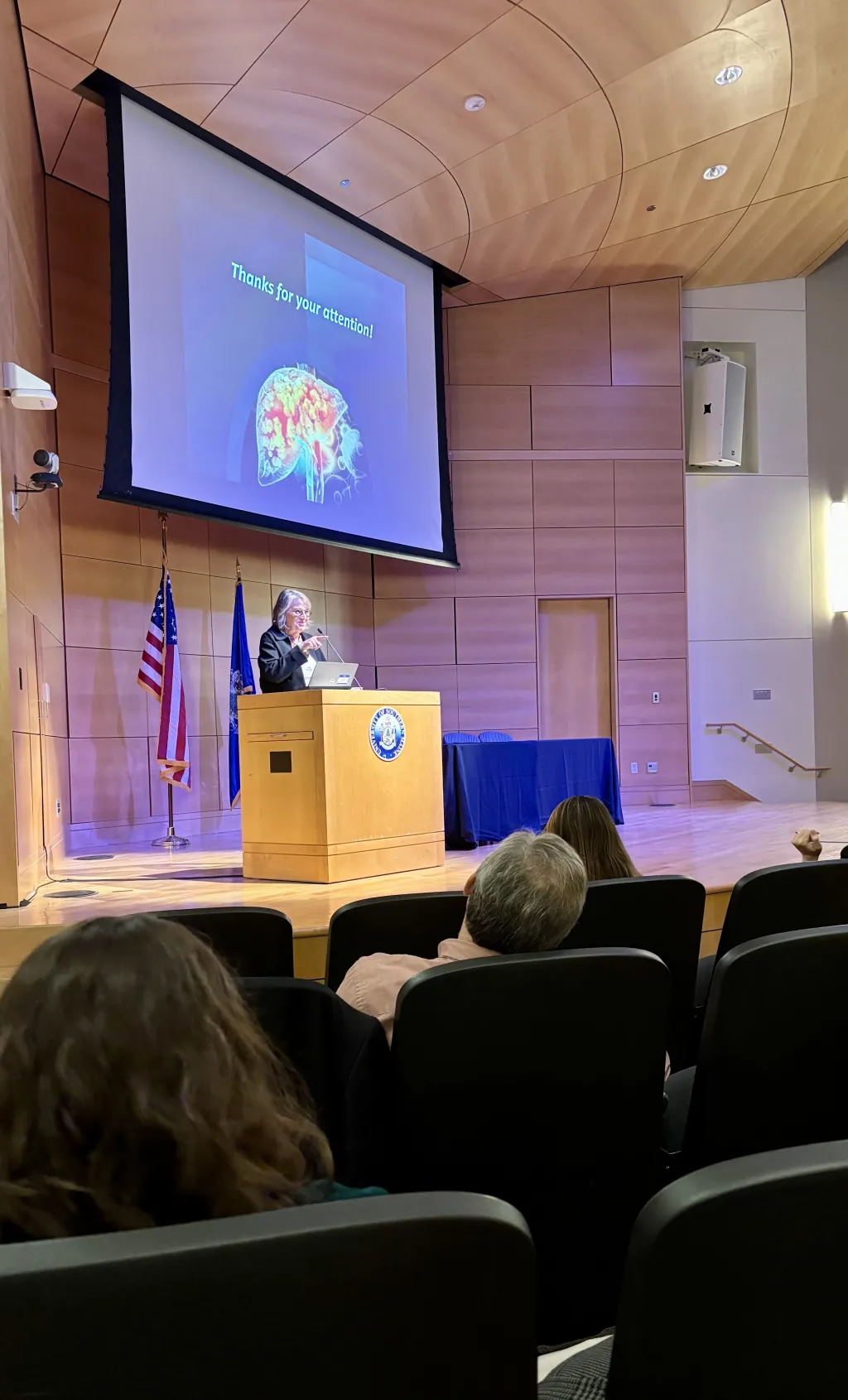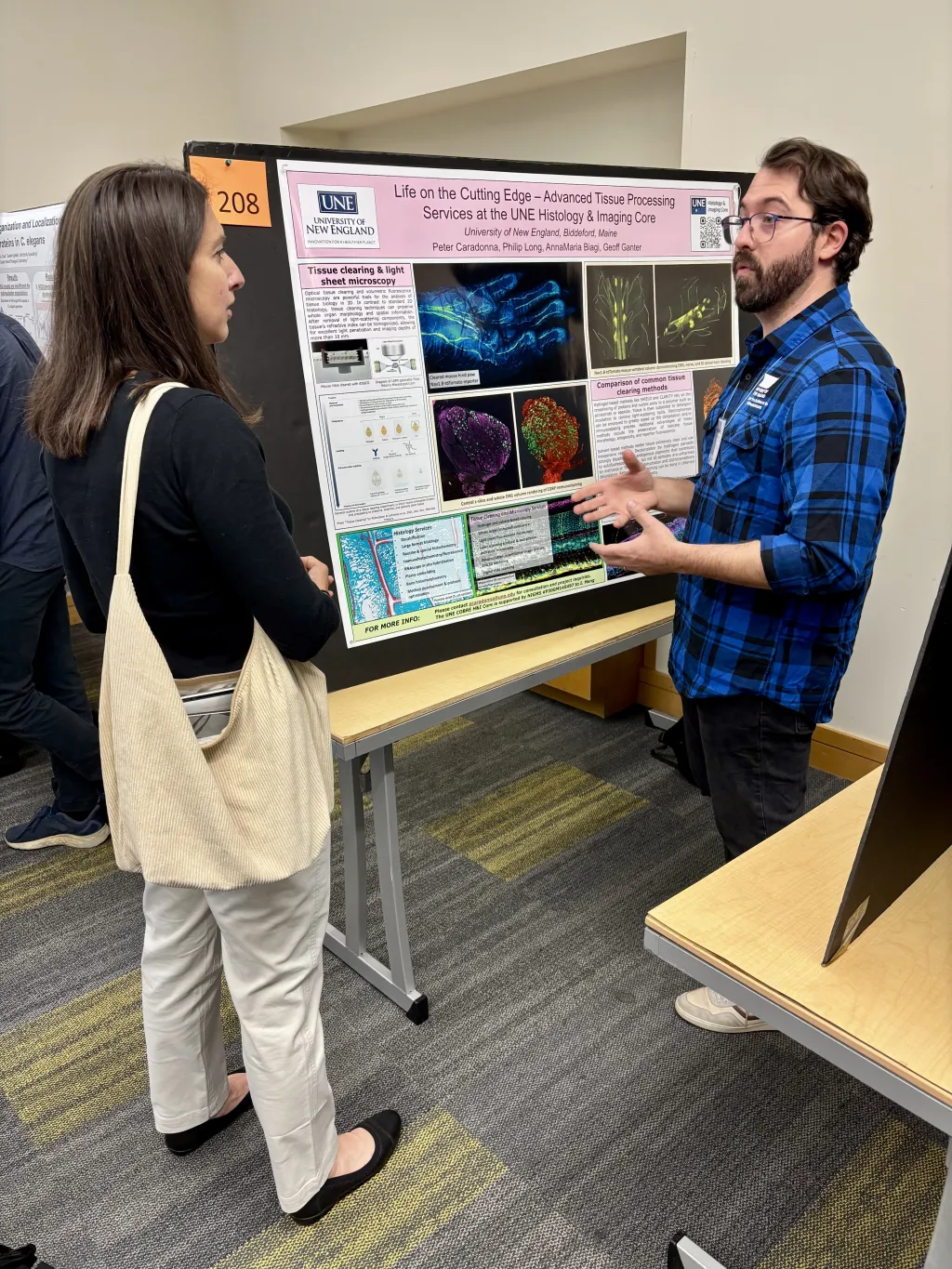UNE scientists, students convene at statewide life sciences conference

Top researchers, science educators, and biotechnology business owners from across Maine — including several from the University of New England — gathered in Portland on Sept. 24 and 25 to share research insights at the 2025 Statewide Biomedical Science and Engineering Research Symposium.
Five UNE researchers and science educators were among the three dozen scientists who spoke about neuromodulation and vision, metabolic factors and genetic influences in aging and diseases, skeletal and cardiac muscles, cell signaling, and tissue regeneration at the conference, held at the University of Southern Maine. Another 14 professional staff and students from UNE, a full quarter of the presenters in attendance, shared research in an adjoining poster session.
The statewide symposium also drew researchers from some of the state’s top laboratories, such as The Jackson Laboratory, MDI Biological Laboratory, the University of Maine and MaineHealth Institute for Research.
“UNE’s impressive trajectory and leadership in research and medical education were on full display at this exciting statewide event, and it was remarkable to hear the breadth of UNE’s work in the biomedical sciences and the impact we are having on research in Maine and beyond,” said Matt Havrda, Ph.D., associate dean of Research and Scholarship within UNE’s College of Osteopathic Medicine.
University of Maine President and Vice Chancellor for Research and Innovation Joan Ferrini-Mundy welcomed the more than 200 who came to Hannaford Lecture Hall on Wednesday by highlighting the collaboration taking place across the state today in biomedical research and how that serves not only people in Maine, but also those across the nation and even the world.
“I glanced at the posters, and this looks to be quite interdisciplinary, as well, which of course is critical in the evolution of science, to be sure that we are working across disciplines and that we are problem-focused and bringing together the expertise that we need to get those problems solved with great innovation and great creativity,” Ferrini-Mundy said.
Karen Houseknecht, Ph.D., UNE senior associate provost and vice president for Research and Innovation, echoed that sentiment, noting that UNE’s grant-funded work contributes significantly to the biomedical industry in Maine and that some of it occurs through collaborations with other labs in Maine.
One example, Houseknecht said, is some of the students in the poster session who are in the University of Maine’s Graduate School of Biomedical Science and Engineering, a program that includes six other cooperating research institutions, including UNE.
“Those students reflect the fact that we collaborate heavily across the state with other institutions. Collaboration empowers us to do big science,” said Houseknecht, the conference chair for the session on metabolic factors in aging and disease who also gave an invited talk about research in her laboratory.
UNE’s commitment to supporting research innovation also can be seen in its initiatives to secure competitive federal grants and provide resources for biomedical research and workforce training, Houseknecht said.
“I’m very proud that UNE is number one in NIH funding the State of Maine for (National Institutes of Health) funding among higher education institutions,” she said. “I think it’s exciting that we’re here at the third statewide biomedical symposium to showcase the innovative work that our faculty, professional staff and student researchers are conducting to address problems facing the people of Maine, and beyond. The fact we bring a significant amount of NIH funding … has an economic impact beyond the University.”
That funding allows UNE to attract top research talent to Maine for well-paying faculty jobs that feed the economy, Houseknecht said. In turn, those faculty go on to mentor undergraduate students at UNE, 46% of whom are engaged with research — more twice the national average — and prepare them to become leaders in Maine’s growing life sciences workforce.
“We’re a contributor lab, but also one that trains research workforce,” she said. “We’re also creating new knowledge, which impacts patients and the economy, providing training opportunities for our medical students, which is an important part of them becoming physicians.”
Havrda, as a research leader within Maine’s only medical school, said the symposium demonstrated the future promise of UNE-educated scientists in contributing to Maine’s health and research ecosystem.
“Much of the research progress presented was driven by our students, who work within the numerous nationally recognized research teams that call UNE home,” he said. “We’ll all be watching the careers of these young scientists and physicians intently and are certain they will impact the well-being of Mainers for years to come.”
Recently, UNE retained its status as one of the nation’s leading research institutions in the 2025 Carnegie Classification of Institutions of Higher Education, making it one of just 139 such colleges and universities in the nation with the marker of “High Research Spending and Doctorate Production.”
In fiscal year 2024 alone, UNE secured $18.6 million in extramural funding across 35 research projects.
UNE’s research and innovation enterprise is already supported by a robust foundation that includes two National Institutes of Health-funded Centers of Biomedical Research Excellence (COBRE), membership in the workforce-focused Maine IDeA Network of Biomedical Research Excellence (Maine INBRE) that aims to build research capacity in historically undeserved states, and partnership with the MaineHealth Institute for Research.
In addition, the Portland Laboratory for Biotechnology and Health Sciences at UNE, inaugurated in 2023, advances collaborative, interdisciplinary research in biomedical and biotechnological sciences, facilitating opportunities for strategic industry partnerships and intellectual property licensing for research faculty.
Across these endeavors, UNE faculty are discovering new ways to address unmet medical and societal needs, patenting their discoveries, and launching companies to commercialize their work. Students participate in this enterprise at every stage, with undergraduates conducting research and pursuing real-world experiences in UNE innovative venues such as in UNE’s P.D. Merrill Makerspace, the new Sustainable Innovation Center, student innovation showcases, and through industry research projects.
Gwendolyn Mahon, M.Sc., Ph.D., UNE’s provost and senior vice president of Academic Affairs, said bioscience jobs are more in demand in Maine today, according to the BioME’s annual report, and it’s one of many areas where UNE is focused on workforce development. She said the annual statewide symposium highlights this important contribution to Maine’s economy.
“UNE is a proud partner in this symposium as so many organizations here today are also focused on innovating to improve people’s lives and bolstering Maine’s economy in the life sciences,” Mahon said. “I’m especially delighted to see so many UNE graduate students here sharing their research and collaborating alongside veteran scientists — from UNE and other Maine institutions — who are at the cutting edge of research in their fields.”

Karen Houseknecht, Ph.D., presents.

UNE’s Peter Caradonna shares his research.